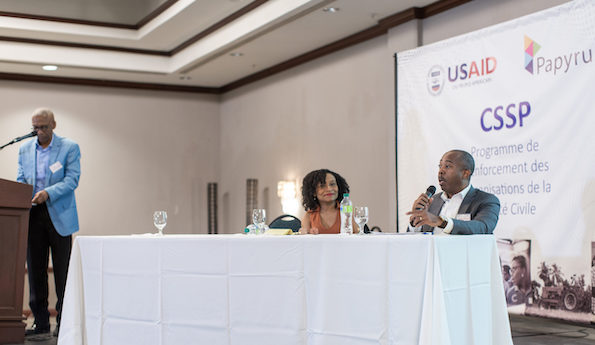On the USAID-funded Haiti Civil Society Strengthening Program (CSSP), led by Papyrus, a Haitian management firm, Counterpart is conducting training courses and providing mentoring to improve the advocacy capacity of local civil society organizations and shore up their networks at the national and grassroots level.
The goal is to facilitate improved governance and service delivery that better supports vulnerable communities. The project aims to enhance the capacity of select organizations to develop, implement, and monitor their advocacy and service delivery more effectively.
In July 2023, we conducted an “Advocacy 101” training of trainers for the CSSP consortium members and Haitian advocacy firms. This session was intended to teach our partners and select service providers how to help local civil society leaders develop a more standardized approach to advocacy, encourage them to gain a deeper understanding of their own organizations’ strengths, and develop concrete, action-oriented advocacy plans. Kourtney Pompi, Counterpart’s director for civic engagement, led the training focused on identifying challenges the organizations seek to address, assessing the context and issues, enlisting allies, and developing messages to change public policies, practices, and development priorities. These are all steps in an advocacy cycle. Training participants learned how to help civil society organizations develop their own action plans based on their goals.

Participants during the online training session.
Building on this training of trainers, in November we worked with co-facilitators to deliver sessions to a group of seven Haitian civil society organizations, to be followed by additional trainings for hundreds of organizations over the coming years. The team also completed a social network analysis to inform coalition building aimed at amplifying citizen voices around key issues.
Through this training and future ones, the project supports local organizations as they implement advocacy and service-delivery activities in favor of migrants, children, and gender-based violence survivors, supporting improved access to healthcare services, the upholding of human rights, and peace building.
As Pompi explains, “most of the participating CSOs are subject-matter experts with decades of experience defending the rights of their constituents. This training will allow them to work more systematically and efficiently to bring about the change they want to see.”






